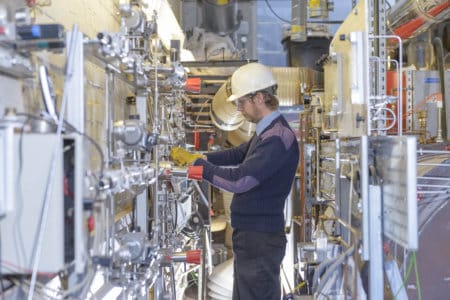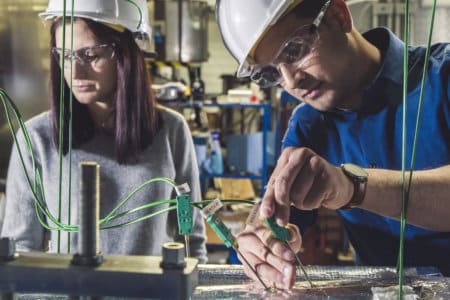What gives a student from Cranfield University an edge when pursuing their dream careers? Ask Fin Underhill, an MSc, Advanced Heat Engineering graduate, and he’ll say, “The Careers and Employability team at Cranfield.”
From as early as induction week, Fin had been applying for graduate jobs and internships – but he wasn’t having much luck. That is, until he received an invitation to a whole-day group interview for National Nuclear Laboratory for a role he’d wanted since before joining college. Six days later, NNL called with good news: they would like to offer Fin the role of Nuclear Scientist near Liverpool.
Fin was elated – and glad he reached out to the Careers and Employability team early. “Ellie did an outstanding job of preparing my interview skills, technical presentation, and overall confidence for the assessment centre over five one-to-one appointments,” he says. “She highlighted my strengths and weaknesses, showed me exactly what the employers were looking for, and overall was a joy to work with!” A good track record of helping students unlock their potential, develop talent and greatly enhance their employability is by no means the university’s only achievement. The specialist postgraduate university located at the heart of the UK’s Cambridge – Milton Keynes – Oxford arc has been ranked fifth in the UK and top 30 in the world in the subject area “Engineering – Mechanical, Aeronautical and Manufacturing,” according to the QS World University Rankings by Subject 2023. The Research Excellence Framework classifies 88% of Cranfield’s research as world-leading or internationally excellent, ranking it seventh in the UK for research power in engineering. Cranfield is also a six-time winner of the Queen’s Anniversary Prize for Further and Higher Education. These represent just three of the many rankings and awards that make it an exceptional UK university.

Cranfield University boasts a professional alumni community of over 75,000 across 171 countries. Source: Cranfield University
Diverse courses tackling sustainability challenges in the 21st century
For all its career success stories and accolades, perhaps what’s more profound is the university’s long history of creating leaders and innovators in specialist areas of science, technology, engineering and management. At the School of Water, Energy and Environment, you’ll experience the best preparation to join a new generation of leading scientists, engineers and managers capable of creating a more equitable and sustainable future. To that end, Cranfield offers courses emphasising specialised knowledge unique to each discipline. Each is paired with an emphasis on practical learning to ensure every learner not only gains employment but is also prepared to change the way society thinks, works and learns.
Its postgraduate offerings include MSc degrees in the areas of Energy and Sustainability, Water, Environment, Agrifood and Design.
Take Agrifood, for example, these technical master’s courses weave science and technology with management know-how. The multidisciplinary skills you acquire from completing one of the Agrifood MScs are in demand by growers, food retailers, agrochemical companies, government agencies, logistics and supply chain companies and research institutions across the world. Graduates have secured positions at renowned institutions like Unilever, PepsiCo, GlaxoSmithKline, Warburtons, Discovery Foods, Sanofi Aventis, and Rothamsted Research.
Cranfield’s qualifications and support help graduates to develop long-standing careers and the chance to make a difference. As an intern with non-profit EcoSwell in Northern Peru, Renewable Energy MSc graduate Laurie Cusick was part of a project that aimed to provide an uninterruptible power supply for a highly relied-upon medical centre in the region of Talara. His team was responsible for the design, installation, and handover of a solar PV and battery storage system – for which his Cranfield degree and experience helped.
“I’ve learned an awful lot about energy and sustainability, including less conventional study topics such as legislation and policy, and economic strategy for a secure energy transition,” he says. “However, nobody can take everything in permanently and I’d say a big skill I developed over the year was an ability to research new topics that I’m not familiar with and gain an understanding within a short amount of time. This is a key skill for the course, particularly the taught modules.”
Such impact comes down to an enriching learning environment that is made possible thanks to a small class setting. With a one-to-five staff-to-student ratio, one of the best in the UK, students like Laurie have the keen attention of faculty. They can truly soak in their input to one day deliver practical solutions that boost efficiency and reduce their impact on the environment in their respective fields. Many of the teaching staff have industry backgrounds and are leading academic experts in their field. “My supervisors and lecturers were really helpful over the year and I also had the opportunity to work with some recognised organisations in the group project and my thesis,” says Laurie.

On campus facilities enable students to apply their learning and develop their practical skills. Source: Cranfield University
Career opportunities post-graduation
Laurie is now preparing to start his new role at RED Engineering Design, an organisation he first came into contact with through one of the careers fairs at Cranfield. “Many of the topics I discussed throughout the recruitment process were things I learned about throughout the course, and I’m really looking forward to applying what I’ve taken from my MSc in a work environment,” he says.
Grace Harland, an Advanced Water Management MSc graduate, believes she gained many transferable skills, especially when she undertook a group project. Her course was split up into modules, a group project and an individual thesis project. The group project followed the modules and lasted for approximately three months. Grace could choose from a number of options, each of which included opportunities to collaborate with other students studying on other water courses at Cranfield, to produce a report and a poster presentation which were provided to the client. “My individual project was on climate change modelling. This involved producing a number of greenhouse gas emission scenarios and assessing the future impact of the agriculture and forestry sector,” Grace commented.
This project was the highlight of Grace’s course. “We worked on a group project on diffuse pollution for Natural England, which involved a field trip to Norfolk to collect data for our report,” she says. “We analysed, interpreted, and made recommendations based on the collected data to produce the final report. At the end of the project, we presented the key findings to the client. “The experience and skills in the MSc proved pivotal in helping Grace secure her role as an Asset Scientist at Affinity Water. It was an “important step forward” in her career.
All international students have access to Cranfield Symplicity (an online careers portal featuring jobs and employers interested in recruiting Cranfield international graduates) and can find verified UK job opportunities via Student Circus (the leading careers portal for international students). One-to-one coaching and immigration advice are also available. Explore the full range of support services.
Click here to learn more about Cranfield University.
Follow Cranfield University on Facebook, X, YouTube and Instagram.













